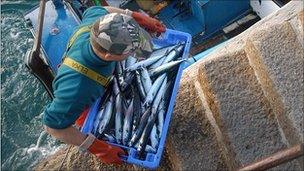MPs urge changes to fishing quota management
- Published

The committee said small vessels were losing out to large, commercial fishing enterprises
The way ministers are managing the fishing industry in England has been criticised by MPs.
The Environment, Food and Rural Affairs Committee said it was "unacceptable" that the government was not monitoring the trading of EU fish quotas.
It said an unknown number were being bought and sold by people with little or no link to the industry "at the expense of working fishermen".
The government said it had already proposed "radical reforms".
And one leading fishing organisation said the report - which covers only England as fisheries policy is devolved in Wales, Scotland and Northern Ireland - was "in many ways unhelpful".
Quota restrictions are in place for some species and limit the amount of fish which can legally be landed.
Under the current system, not all quotas are held by working fisherman. Some holders may be retired or inactive - so called "slipper skippers" - while others may be organisations or individuals outside the fishing industry.
These quotas may then be leased back to ordinary fishermen or traded for profit.
'Life-line'
In their report, the committee members said they were "shocked" to discover that the Department for Environment, Food and Rural Affairs (Defra) did not monitor who those outside holders were.
Anne McIntosh, the Tory MP who chairs the committee, said the she was urging Defra to "justify" the current situation since quotas should only be traded if there was a "clear benefit" to fishing communities.
"The quota has been developed as an economic commodity and is being traded, I understand, sometimes even by football clubs," she told the BBC.
"We're saying that we need to know who these non-fishing interests are. The government does not know so we need to have a register. And we need to make sure that, as far as possible, these quotas should not be traded but actually should return to be used by the fishing communities."
The committee also said it was concerned that due to a historic miscalculation, smaller vessels under 10 metres (33ft) long had an unfairly small quota share compared with larger offshore enterprises.
It recommended a redistribution - a move that Ms McIntosh said would provide "a life-line for those fishing communities most vulnerable to the current rules".
Discard problem
The MPs also urged Defra to do more to tackle the problem of discards, where fish are thrown back into the sea - often to die - because they are of an unwanted species or size, or because of quota restraints.
Celebrity chef Hugh Fearnley-Whittingstall has led a high-profile public campaign against the practice.
Ms McIntosh said: "We were encouraged to hear that Defra is already undertaking work to address this problem, but we believe the department could do more to build on the success of trials such as Project 50%."
Project 50% was a Defra-funded trial in Devon in which technical modifications were made to the trawler fleet to help fishermen better target their desired catch. It resulted in a 50% reduction in discards.
Fisheries Minister Richard Benyon acknowledged the management of the quota system "needs an overhaul".
"I've proposed radical reforms to make the system simpler, giving fishermen more say and fishing communities the opportunity to support their local fleet," he said.
"The industry needs more freedom to fish so that all fishermen have the opportunity to thrive. I'm determined to secure a sustainable, long-term future for our fishermen."
'Freedom to fish'
The National Federation of Fishermen's Organisations, which gave evidence to the committee during its investigation, said the report's findings were "superficial".
"There are major issues that need to be addressed but I don't think they have grasped them," its chief executive Barrie Deas told the BBC.
The quota trade had grown up in an "ad hoc" way, he said, and in many ways was "working well" - although he acknowledged there was an issue about smaller vessels getting access to it with appropriate safeguards.
"It has ensured quota can be moved around so it gets to where it is needed. It has helped adjust the industry to much tighter quotas."
On discards, he said levels had halved over the last decade and "progressive reduction" was the right way forward.
The European Commission is seeking to reform the Common Fisheries Policy by guaranteeing vessels quota shares for periods of at least 15 years.
But UKIP leader Nigel Farage said fishermen would not get a fair deal until the UK withdrew from the EU.
"Of course fishermen need freedom to fish, but the freedom they need is not from Whitehall but from the EU," he said. "Arguing about quotas is the wrong argument and we need to take back control of our territorial waters."
- Published12 May 2011
- Published12 May 2011
- Published12 April 2011
- Published1 March 2011